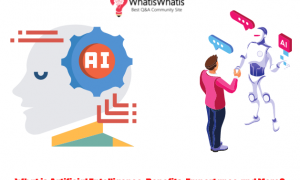Artificial Intelligence (AI) is no longer a futuristic technology. But rather a reality that is being embraced by businesses of all sizes and industries. In fact, according to MarketsandMarkets research, global AI spending is expected to jump from $8.52 billion in 2018 to $191.62 billion by 2025. The retail industry is one sector that is quickly adopting AI technologies to improve the customer experience & operational efficiency. Here are the top 10 use cases of Artificial Intelligence in the retail industry in 2022.
Know more: How Retailers Can Help Shoppers During Corona Outbreak?
AI Uses in Retail Industry 2022
Artificial Intelligence in the retail industry is increasingly being deployed in a variety of ways. Here are some of the top use cases of AI in retail that are expected to gain traction in the next few years:
1. Predictive Maintenance for Better Customer Experience
Predictive maintenance is one of the most significant ways in which AI can be used in retail. Moreover, predictive analytics allows retailers can detect potential issues with products and equipment before they cause any customer disruption. This helps to improve customer experience by ensuring good product availability.
2. Automated Inventory Management
Inventory management is a critical but often challenging task for retailers. AI can help reduce the burden on staff by allowing them to track inventory levels & restocking shelves. This can free up time for employees to provide outstanding customer services.
3. Personalized Recommendations
Personalized recommendations are a key way to increase sales & build customer loyalty. AI can help retailers create personalized recommendations for each customer based on their past purchase history. This helps to ensure that customers only see the products that are most relevant to them. As a result, it will increase conversion rates and order values.
4. Optimized Pricing
Pricing is a complex task. It requires retailers to consider multiple factors, such as competitor prices, cost of goods sold, and customer demand. AI can help optimize pricing by considering these factors and more. This can help retailers maximize profits while still offering competitive prices.
5. Improved Fraud Detection
Fraud is a major problem for retail businesses, costing them billions of dollars each year. AI can help improve fraud detection by analyzing data to identify possible fraud patterns. This can help retailers protect their bottom line and improve customer confidence.
Read more: How To Protect Your Credit Card From Hackers?
6. Automated Customer Service
Customer service is a crucial part of the retail experience. AI can help automate customer service by providing rapid responses to common questions and concerns. This can free up staff to provide more personalized service to customers and improve the overall customer experience.
Know more: Top Customer Service Tools Your Brand Needs To Win Heart Of The Customers
7. Enhanced Target Marketing
Target marketing is an essential tool for retailers who want to boost sales and encourage customer loyalty. AI can help enhance target marketing by identifying the most effective strategies for customers. This ensure that marketing efforts are more efficient and effective. And therefore, it results in higher conversion rates.
8. Increased Supply Chain Efficiency
The supply chain is a critical but often complex part of the retail business. AI can help increase efficiency by automating tasks such as order management and tracking. This can help to improve inventory turnover and reduce costs.
9. Facial Recognition for Security
Facial recognition is a powerful tool for security purposes. AI can help retailers use facial recognition to identify potential threats and prevent them from entering the store. This helps to keep employees and customers safe while also deterring crime.
10. Emotion Detection for Customer Insights
Emotion detection is a relatively new technology. It shows great promise for retail applications. AI can help retailers detect customer emotions in real-time. It can provide valuable insights into customer behavior. And thus, this information can be used to optimize the customer experience & boost sales.
The Future of Artificial Intelligence in Retail Industry 2022
Retail industry in the past few years have concentrated on Artificial Intelligence trends. Many retailers have started to experiment with AI and are now beginning to see its potential to transform their businesses.
In fact, according to a recent report from PwC, AI is expected to add $15.7 trillion to the global economy by 2030. Retail is one of the sectors that is expected to benefit the most from AI, with an estimated boost of $1.2 trillion by 2025.
Learn more: Top E-Commerce Web Development Trends in 2022
Retailers can use AI in a variety of ways. For example personalizing recommendations, automating customer service, and optimizing pricing and promotions. AI’s most exciting application for retail is in-store experience.
In-store experience is a critical part of retail. But it is also one of the most challenging areas to get right. AI can help retailers create a more personalized and seamless in-store experience for their customers.
As AI becomes more adept at understanding human behavior, it will be even more important in retail. Retailers that embrace AI will be able to create unique experiences. It will allow them to stand out from the competition.
Last Say
Artificial Intelligence in retail use cases is vast and varied, as we’ve seen. In this blog, we took a look at some of the most exciting and transformative ways that AI is being used to change how retailers do business. Predictive analytics is one of the most powerful applications of AI.
By analyzing past data and trends, retailers can use predictive analytics to get ahead of customer needs and preferences. They can ensure they always have what customers want before they even know they want it. This helps reduce waste while also increasing profits by predicting which products will be in demand.
While it’s still early days for AI in retail, there are already some compelling use cases. And these show the potential for this technology to revolutionize the industry. 2022 is likely to be a pivotal year for AI as retailers start to fully embrace its capabilities and see real benefits from its implementation.
Author’s Bio:
Erma Winter is an expert app developer at MobileCoderz, the best Mobile App Development Company. With more than 11 years of professional expertise, She has worked with various leading startups and established enterprises. Apart from his/her professional experience, She writes for a tech magazine and makes people aware about human rights. She likes to participate in social welfare campaigns and conducts webinars with tech experts.






Leave a comment